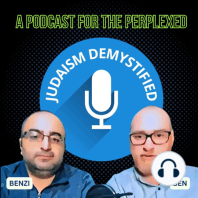1 min listen

Episode 41: Dr. Brian Keating "God and the Astrophysicists"
FromJUDAISM DEMYSTIFIED | A Guide for Today's Perplexed: Confronting the Challenges of This Generation
Episode 41: Dr. Brian Keating "God and the Astrophysicists"
FromJUDAISM DEMYSTIFIED | A Guide for Today's Perplexed: Confronting the Challenges of This Generation
ratings:
Length:
49 minutes
Released:
Jan 30, 2023
Format:
Podcast episode
Description
Dr. Brian Keating's book 'Losing the Nobel Prize' is a memoir about his scientific and personal journey. In one of his talks, he said, "searching for God was in a way searching for my father." He explains how being estranged from his father impacted his relationship with God. Raised Catholic by his stepfather, he spent a year as an altar boy, but his spiritual search eventually led him to becoming a Baal Teshuva. We discuss how Judaism requires one to ACT, not necessarily to BELIEVE. Discover how this particular fact about Judaism shaped who he is, why he returned to his roots after becoming an atheist, and how he reconciles the seeming tension between religion and science. Also, it seems that scientists are reverting to the Eternal Universe Model to avoid the implications of the Big Bang (via the Multiverse theory). Many scientists insist that if God were to exist, something MUST have created Him, yet they don't apply the same logic to the universe. In this sense, is science any different than dogmatic religion? On another note, he explains how space and time are related and why this is so fundamental. We also touch on the big question about mathematics: Is it hardwired into the fabric of the universe, or are we creating it to understand and navigate our world? Lastly, we ask the professor if he thinks aliens exist, which is always a fun topic. (His talks with Ben Shapiro, Lex Fridman, Avi Loeb, Dennis Prager, Eric Weinstein, and Neil Degrasse Tyson are available on all major platforms.)
• Thank you to friend of the podcast Zev Gotkin of Zev Media for guest co-hosting this episode!
• Thank you to friend of the podcast Zev Gotkin of Zev Media for guest co-hosting this episode!
Released:
Jan 30, 2023
Format:
Podcast episode
Titles in the series (93)
JUDAISM DEMYSTIFIED : A Guide for Today's Perplexed | Jewish Philosophy | Torah | Rational Bible (Trailer) by JUDAISM DEMYSTIFIED | A Guide for Today's Perplexed: Confronting the Challenges of This Generation